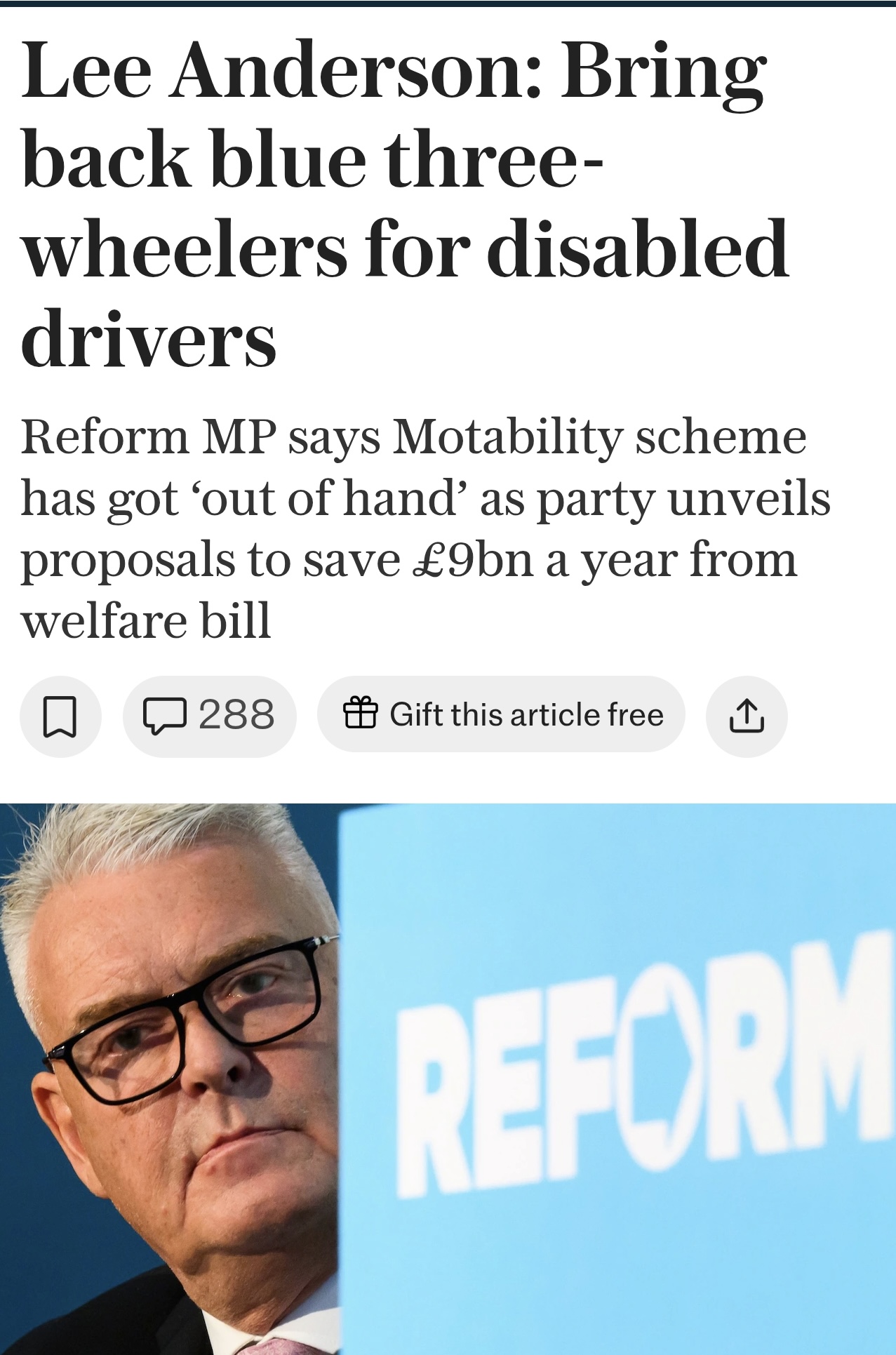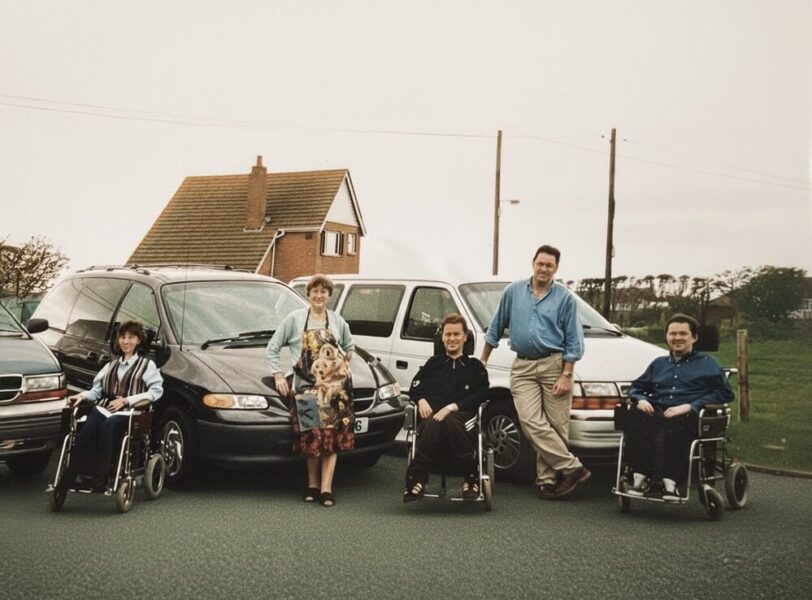They say every picture tells a story.
In this old family photo from the 1990s, I’m sitting outside our home in rural Wales with my brother Ian and sister Lyn. My brother Alan isn’t in the photo. Behind us stand three Chrysler Voyagers — wheelchair-accessible Motability vehicles that gave us the freedom to live, work, and stay connected with the world.
All four of us were born with muscular dystrophy, a severe muscle-wasting condition that gradually weakens the body. Those cars weren’t symbols of luxury — they were symbols of independence.
For over three decades, the Motability scheme has enabled around 815,000 disabled people to exchange their mobility allowance — such as the enhanced rate of PIP — for a leased car, scooter or powered wheelchair. Now, with Chancellor Rachel Reeves reportedly eyeing major tax changes, the future of this essential route to independence is uncertain.
What the picture tells me about Motability
When I look back at that old photograph today, three things strike me with painful clarity.
First, my three siblings have all since passed away as a result of their disability. They were not “borderline” cases or people misusing the system, but young adults living with a severe, life-limiting condition who relied on adapted vehicles to live their short lives as fully as possible.
And despite what critics claim, it is far from easy to qualify for a Motability car. To be eligible, you must first receive the enhanced rate of the mobility component of Personal Independence Payment (PIP) — and anyone who has been through that process knows it is anything but plain sailing.
Second, those cars were far from “free”. My family had to raise funds locally — this was long before social media or GoFundMe — and we handed over our mobility allowance for several years to access our cars. Personal savings made up the rest.
And third, those vehicles were indispensable. In the 1990s, public transport was largely inaccessible — and in any event, we were too severely disabled to use it. Living in rural Wales, without a car we would have been completely cut off from work, education, friends, and family.
Those adapted cars gave us freedom and equality — the ability to live life on our own terms. That is what the Motability scheme represents.
I no longer have a Motability car, and I have no vested personal interest in the scheme. But I know how transformative it was — and I would hate to see today’s young disabled people and their families priced out of the same independence, choice, and opportunity that my late siblings and I once enjoyed.
What’s at stake now
The Chancellor, Rachel Reeves, was widely reported by The Times to be preparing major changes to the Motability scheme in next month’s Budget — including removing VAT and insurance-premium-tax exemptions and restricting access to premium vehicles in a bid to save around £1 billion.
However, by 27 October 2025, The Telegraph reported that Reeves had decided against changing eligibility criteria for the scheme, suggesting that disabled claimants may have been spared in this round of reform.
Even so, uncertainty remains. Motability Operations has warned that removing VAT relief — if it were to go ahead — would add at least £3,000 to even the cheapest three-year lease, putting cars out of reach for many on modest incomes. The company has made clear that 100 per cent of the VAT zero-rating benefit is passed directly to disabled customers; the scheme itself runs on a small margin assuming that relief remains. Remove it, and the cost lands entirely on disabled people.
This is not an abstract policy tweak. It would mean thousands of pounds more every three years for some of the poorest disabled people in the country — at a time when disabled households already face around £975 a month in extra costs compared with non-disabled households.
A government looking in the wrong place
What’s driving these proposed cuts isn’t cruelty — it’s money, and the politicians who seek to sow division for their own ends.
The Chancellor has said she “can’t leave welfare untouched” as she tries to fill gaps in the public finances. Yet spending on benefits remains at around 23–24% of total government expenditure, and long-term trends show little evidence of a dramatic rise in working-age caseloads. This narrative of a “welfare explosion,” however, obscures the real issue: structural economic weakness and Brexit-driven revenue shortfalls.
In the same week cuts to Motability were reported, Rachel Reeves admitted that Brexit hit the UK economy far harder than expected.
That damage has left the country poorer, less competitive, and generating less tax revenue. If the Government recognises that Brexit is at the root of the problem, the question surely must be: why are disabled people being asked to pay the price?
Rather than fixing the structural economic damage of Brexit — by rebuilding trade relationships, investing in growth, and supporting innovation — the Treasury appears to be reaching for quick savings from welfare, PIP, and now Motability.
It would be deeply regrettable if a Labour Chancellor were to follow the path of the Conservatives, Reform UK, and certain commentators who have sought to vilify the Motability scheme. Too often, the right-wing media peddles the lie that people are being handed a “free car” at the taxpayer’s expense, stoking resentment in the press and on social media.
Turning policy failure into culture war
At this year’s Conservative Party Conference, Kemi Badenoch dismissed recipients with less visible impairments, saying “cars are not for people with ADHD” — implying the scheme was being exploited.
On social media, right-wing commentator Isabel Oakeshott went further, claiming that “many young people supposedly too sick to work prefer to just sit on the sofa and order Deliveroo and drive their Motability free vehicle.”
Reform MP Richard Tice declared on X that the scheme “was never designed to give £50,000 Mercs to bed-wetting boy racers,” echoing a wider tabloid narrative that equates mobility support with extravagance.
That narrative moved from social media into official policy this week, as Reform UK — now polling ahead nationally — announced a new “luxury cars” crackdown on Motability, targeting recipients driving BMWs and Mercedes, according to the Express.

At the press conference unveiling the proposal, Reform MP and Chief Whip Lee Anderson described the scheme as “an absolute scandal,” adding that “if you were on disability and wanted a car from the state, it used to be a blue three-wheeler.”
It’s worth noting that Mr Anderson has himself claimed over £23,000 in taxpayer-funded MP travel expenses between March 2020 and March 2024.
The party says it wants to “end misuse” of the scheme, but the proposal continues a pattern of divisive rhetoric that fuels resentment and portrays disabled people as undeserving of support rather than citizens entitled to mobility and opportunity.
The problem isn’t Motability — it’s an economy still reeling from political decisions made nearly a decade ago.
Motability vs company cars
Here’s another uncomfortable truth.
The Motability scheme is estimated to cost around £2.8 billion a year, funded through disability benefits that allow disabled people to lease a car, scooter or powered wheelchair and maintain independence. Meanwhile, the taxable value of company-car benefits — a perk largely enjoyed by higher-earning employees — was around £3.3 billion in 2023–24, according to HMRC data.
Both involve significant sums linked to public policy. Both can be open to misuse. Yet only one routinely attracts political and media attacks.
Why is it that a wheelchair user’s adapted vehicle is questioned and politicised, while company-car perks for directors are treated as business as usual?
If fairness is really the goal, the question almost asks itself: why is Labour so reluctant to introduce a modest wealth tax — something most Britons support — yet so ready to take from those who have the least?
If the Chancellor truly wants fairness and fiscal responsibility, she should start by levelling scrutiny — not levelling down disabled people’s independence.
The “luxury car” myth
Some critics argue that people on Motability don’t need expensive cars. But those critics miss the point entirely.
Ignorant politicians and a small minority of bad actors on social media portray Motability as if everyone is getting a brand-new Mercedes every three years. That’s simply not true. The vast majority of Motability vehicles are standard, affordable models. Only around 5% come from premium brands such as BMW, Audi, or Mercedes — and in those cases, customers often make significant upfront payments themselves to upgrade.
Back in the 1990s, our Chrysler Voyagers would have been seen as “luxury” vehicles. Yet they were chosen because they were among the few models that could be properly adapted for wheelchair users. A Lada or a Ford Escort could never have accommodated an electric wheelchair passenger or driver.
The same applies today. A wheelchair-accessible Mercedes Vito might look like an executive vehicle, but for someone with a severe disability it can mean the difference between leaving the house and being trapped indoors. For many, space isn’t a luxury — it’s a necessity. The scheme exists to help disabled people get vehicles with specific adaptations so they can travel independently — whether that’s a steering-wheel modification, a powered ramp, or a winch to pull a wheelchair into the vehicle.
This is not about luxury. It’s about practicality, safety, and dignity.
Motability is not free — and it works
Motability customers already contribute significantly. Disabled people pay for the lease by choosing to spend part — or all — of their mobility component of PIP. For wheelchair-accessible vehicles, advance payments can run into the tens of thousands of pounds, depending on the adaptations required.

This is not a “free car scheme.” It’s a carefully designed partnership between government and a non-profit charity that delivers independence efficiently and transparently. It’s also a major asset to the UK automotive industry: Motability Operations manages the largest vehicle fleet in Europe, supporting manufacturing, dealerships, and jobs across the sector.
Motability is one of Britain’s great social success stories — something to be proud of, not dismantled. If the Government believes abuse exists, it should review the qualifying benefit (PIP), which is the gateway to Motability, rather than attacking the scheme itself.
Time to protect, not punish
The Motability scheme represents the best of what a civilised society can do: enabling people to participate, not sidelining them.
The rumoured tax changes would make that harder for hundreds of thousands of disabled people. It’s not reform — it’s regression.
I count myself fortunate that my siblings and I came of age at a time when compassion still guided public policy — long before social media outrage, Brexit-driven division, and the economic insecurity that now shape so much of our politics. Those were different times and different values. Senior politicians would not have dreamt of turning on disabled people, or of portraying a scheme like Motability as a burden rather than a badge of a fair society.
I would urge the Chancellor to look again at the real causes of Britain’s fiscal challenges — the fallout from Brexit, stagnant growth, and underinvestment — rather than seeking to balance the books on the backs of disabled people.
The cars in that old photograph gave my siblings and me a measure of equality and normality in a world not designed for us. Today’s young disabled people deserve the same chance.
Cutting Motability would be a betrayal — not just of disabled people, but of the values of fairness, decency, and inclusion that this country once aspired to uphold.






